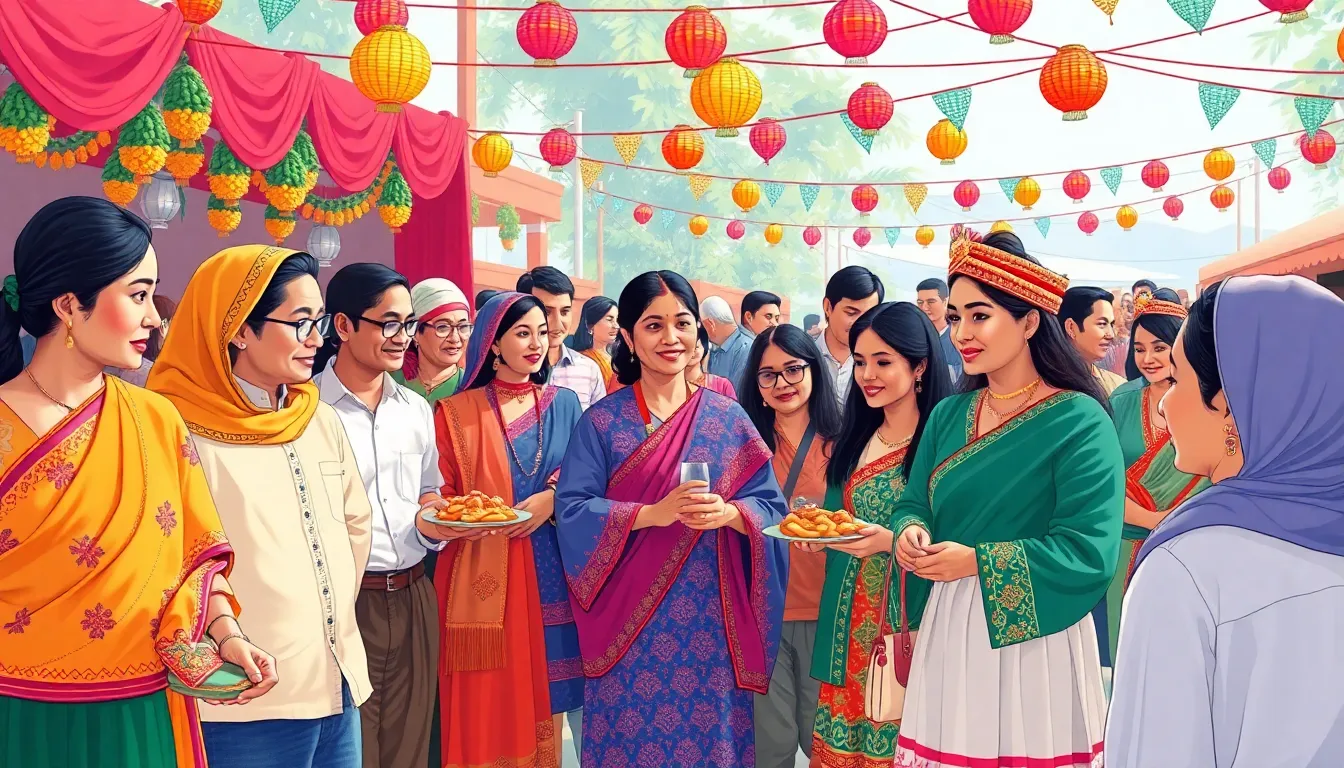Culture is like the secret sauce of society, giving flavor to our everyday lives. It shapes how we think, act, and even what we eat for breakfast—yes, it’s that powerful! From the music that gets us dancing to the traditions that keep us grounded, understanding culture is key to navigating this vibrant world.
Table of Contents
ToggleWhat Does It Mean to Define Cultural?
Defining cultural involves understanding its multifaceted nature. Culture encompasses shared beliefs, customs, practices, and values that characterize a group or society. It isn’t limited to art or music; cultural elements also include social norms, food traditions, and communication styles.
Culture shapes identity and influences individuals’ worldviews. When people engage with different cultural expressions, they gain insights into the experiences of others. Exploring cultural definitions clarifies how societies interact with one another.
Language plays a vital role in defining culture. It serves as a medium for expressing ideas, transmitting values, and fostering connections. Different languages capture unique cultural nuances, which shape each group’s perspective.
Visual arts, music, and literature reflect cultural identities. They encapsulate historical narratives and collective memories. Exposure to diverse cultural expressions enhances appreciation and understanding of global diversity.
Social customs also define cultural dynamics. Norms regarding greetings, celebrations, and rituals offer a glimpse into a society’s values and priorities. Observing these interactions encourages respect and adaptability.
Defining cultural requires acknowledging its evolution. Cultures adapt and change over time due to globalization and technological advancements. This fluidity contributes to enriched experiences that shape individuals and communities alike.
Recognizing the importance of cultural definitions fosters empathy and inclusivity. It promotes deeper connections among people from different backgrounds. Awareness of cultural diversity encourages collaboration and innovation in various contexts.
The Elements of Culture

Understanding cultural elements provides insight into human behavior and societal organization. Various components shape culture, influencing the way individuals interact within their communities.
Language
Language serves as a crucial element of culture, facilitating communication and expression. It encompasses spoken, written, and non-verbal forms that convey ideas and emotions. Different languages reflect distinct worldviews and ways of thinking. Additionally, dialects and local slang contribute to the richness of cultural identity. Language not only connects individuals but also preserves history and tradition, helping to maintain a sense of belonging within a community.
Traditions and Practices
Traditions and practices embody the rituals and customs passed down through generations. They manifest in festivals, ceremonies, and daily activities that reinforce cultural identity. Specific examples include holiday celebrations, marriage customs, and rites of passage. These elements provide continuity and a sense of stability within a community. Communities often share unique practices that distinguish them from others, enriching the global cultural tapestry.
Values and Beliefs
Values and beliefs form the foundation of any culture, guiding behavior and decision-making. They encompass moral principles, ethics, and views regarding life and existence. For instance, respect for elders, importance of family, and views on education can vary significantly between cultures. These core elements influence social norms and perceptions, shaping interactions among individuals. Recognizing different values fosters understanding and empathy, essential for collaboration in a diverse world.
Importance of Cultural Definitions
Cultural definitions hold significant value in promoting understanding and interactions in a diverse world. They serve as a foundation for navigating complexities in social dynamics.
Understanding Diversity
Recognizing cultural diversity enhances interactions among various groups. Each culture presents unique perspectives that enrich discussions and collaborations. An understanding of these differences fosters acceptance and reduces biases. Furthermore, acknowledging the distinct practices and values within cultures allows for more meaningful connections. Shared experiences across cultures create opportunities for dialogue and learning.
Fostering Inclusivity
Inclusivity stems from acknowledging and valuing cultural differences. Environments that embrace diversity encourage participation from all individuals. A focus on cultural definitions strengthens relationships and promotes mutual respect. Communities benefit when they prioritize diverse voices and perspectives. Providing platforms for underrepresented groups fosters networking and innovation. Cultivating inclusivity in various settings leads to more harmonious social interactions and collaboration.
Challenges in Defining Cultural Concepts
Defining cultural concepts presents numerous challenges due to their complexity and fluidity. Culture shifts and evolves over time, influenced by social dynamics, globalization, and technological advancements. Different communities perceive and interpret cultural elements uniquely, complicating a universal definition.
Variability in terminology arises as terms often carry distinct meanings across cultures. For instance, the concept of “family” may encompass various structures, such as nuclear families, extended families, or chosen families, changing its significance in different contexts.
Intersections of culture with race, ethnicity, and class create additional layers of complexity. People from diverse backgrounds may share certain cultural elements yet experience them differently based on individual identities. This intersectionality calls for careful consideration when discussing cultural definitions.
Understanding cultural relativism is crucial to navigate these complexities. Recognizing that beliefs and practices hold different values across cultures fosters a more nuanced approach to definitions. This perspective helps avoid ethnocentrism, enabling individuals to appreciate cultural diversity without bias.
Moreover, engaging in dialogue with individuals from various backgrounds enriches understanding. Conversations about culture often reveal shared experiences and unique practices, promoting empathy and collaboration among different groups. Embracing these dialogues supports the development of cultural competence.
Cultural definitions also inspire social cohesion and respect by bridging gaps between diverse community members. However, oversimplification may hinder meaningful interactions, as it risks overlooking the richness of individual experiences. To cultivate constructive relationships, acknowledging the intricate interplay of cultural elements remains essential.
Recognizing these challenges in defining cultural concepts enhances efforts to foster inclusivity and understanding in an increasingly diverse world.
Understanding culture is crucial for navigating today’s diverse society. It shapes identities and influences interactions among individuals from various backgrounds. By recognizing and valuing cultural differences, communities can foster inclusivity and empathy.
Engaging with diverse perspectives enriches discussions and promotes mutual respect. This approach not only enhances personal growth but also strengthens societal bonds. Ultimately, embracing the complexities of culture leads to more harmonious relationships and collaborative environments.
As the world continues to evolve, prioritizing cultural understanding will remain essential for building connections and fostering a more inclusive future.




